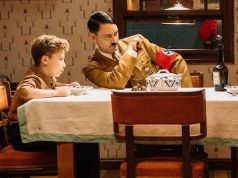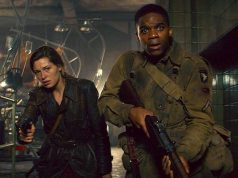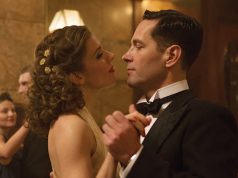Every year, Hollywood produces about a dozen movies about Nazis, and every year there’s one that stands out as being the one that you can just disregard altogether. This year those honors go to “Defiance,” an unengaging, emotionally distant drama from socially conscious director Edward Zwick.
Having already addressed racism, war, poverty, and whatever “Legends of the Fall” was about in such films as “Glory,” “Courage Under Fire,” “The Last Samurai,” and “Legends of the Fall,” it was probably only a matter of time before Zwick took a run at the Holocaust. Here, co-writing the screenplay with Clayton Frohman from a book by Nechama Tec, Zwick tells the true story of the Bielski brothers, Belarussian Jews who helped save a large group of fellow-sufferers by hiding in the forest during World War II. Perhaps befitting the bleak setting, Zwick’s film is cold and unsubtle.
The two oldest Bielski brothers are Tuvia (Daniel Craig) and Zus (Liev Schreiber), the former struggling to cling to his decency and humanity despite the Nazis’ atrocities against his family, the latter having long since given up and now eager to kill whoever (in his view) needs killing. The other Bielskis are Asael (Jamie Bell) and Aaron (George MacKay), the latter a young teen in poor health at the film’s outset.
With Tuvia as the de facto leader, the Bielskis convince a small group of Jews to hide with them, reasoning that if they wait in the ghettos, the Nazis will simply kill them. Zus wants to keep their numbers small, owing to the scarcity of food and supplies, but it’s hard to say no when a new squad of ragtag Jews comes straggling by.
Much of the film is devoted to the power struggle between the saintly Tuvia and the vengeance-minded Zus, who have very different ideas of how best to survive. Zus aligns himself with a squad of Russian soldiers, on the assumption that his enemy’s enemy is his friend, and prepares for armed combat, while Tuvia tries to maintain order back in the forest as winter approaches.
I have no quarrel with the performances from Craig, Schreiber, or Bell — all three do the best they can with what they’re given. The problem is the screenplay, which has weak, unforceful dialogue and tends to substitute dramatic events for characterization. Beyond the loose descriptions I’ve given, it’s hard to say what any of the men are like as people; they’re defined only by what happens to them. This is mediocre World War II storytelling at its mediocrest.
C (2 hrs., 17 min.; )





